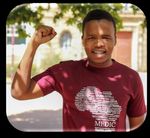Orientation Booklet 2018 - STUDENTS' COUNCIL - UCT
←
→
Page content transcription
If your browser does not render page correctly, please read the page content below
The Health Sciences
Students’ Council (HSSC)
What is the HSSC?
“The Health Sciences Students’ Council (HSSC) is the highest
decision-making body on all issues of student governance at the UCT
Faculty of Health Sciences. It is made up of ten passionate students who
are democratically elected to office. The HSSC members represent and
make submissions which express students’ views, concerns and
aspirations to various committees such as the Faculty Education Board,
the Assessment Committee, the Health and Safety Committee, and the
Dean. In order to gauge student views, constant communication via the
HSSC’s Class Representative system, an extension of the student
governance model, is utilised.
“The key role of the HSSC is to help students fulfil their academic
goal of graduation, by helping to advocate for the most ideal teaching
and learning environment at our Faculty.
“We are privileged to have the structure of the HSSC on our campus
because it helps hold the Faculty, including us at the Deanery,
accountable to the students. The HSSC serves as the bridge between
students and the SRC (Students’ Representative Council), and between
students and faculty management. By not only taking on this
representative role with gusto, but further amplifying the voices of
marginalised students, our HSSC has put student-directed
transformation back onto the university agenda.”
Bongani M. Mayosi, Langa Twala,
Professor and Dean HSSC ChairpersonHow and when to contact us Follow us on social media Come by our office Our office hours are 12:00-14:00 and 17:00-17:30 every weekday. Please do use these times to approach us about events, complaints, ideas or just general engagement. You can find the office by following this mini map:
Send us an email
If you have a question that is specific to a portfolio, feel free to
email us on the email addresses provided on the inside of the
back cover of the booklet. If you are unsure under which
portfolio it falls or would like to submit a general inquiry, please
email: hssc@myuct.ac.za
Give us a call
Call the office at 021 650 3750 (when closed, you will be
forwarded to Regan Boden, the PR & Marketing Officer).
Join our meetings
HSSC meetings take place every second Wednesday,
17H15-19H15 in the HSSC Office.
If you would like to sit in on a meeting, please email Ren
Hoekstra, the Secretary General, at hssc.secretary@uct.ac.za
at least 24 hours in advance. If you would like to submit an
agenda point, please send this through to the same email
address at least 48 hours in advance.
When should I contact the HSSC?
If you need assistance with:
Academic/Financial Research opportunities
exclusion Arranging concerts at
Academic and our faculty
psychosocial support Talks by influential
Needle stick injuries speakers
Acquiring TB while on Sports events
duty Talent competitions
Problems with transport Starting your own
Financial problems project
Getting in contact with …Or anything else!
the Deanery or SRC
Speak to the HSSC! We are at your service.The Mission and Vision of the HSSC
Our Mission
1. To act as the link between students and faculty
management; and to prioritise advocacy for students’
rights, needs and overall interests within this role.
2. To advocate for the interests of all health sciences
students in broader university structures.
3. To support students in the most appropriate way, as
determined by the student or student grouping in question.
4. To provide continuous consultation and feedback to
ensure optimal transparency with students.
5. To not only fulfil our constitutional responsibilities in an
excellent manner; but to further actively evaluate and
promote academic excellence of all our students.
6. To amplify the voices of marginalised students.
“The greatest challenge for any students’
council is representing the views and
concerns of all students as accurately as
possible. While it is admittedly impossible
to represent each individual student’s
ideas, our team has prioritised
transparency and engagement with our
students to nonetheless ensure that every
student’s voice has a chance to be heard
and considered. Our team believes that
true representation puts those voices that have been silenced
and neglected in the past, first.”
- Leago Sebesho, Deputy ChairpersonOur Vision for 2018
1. Ensure maximum transparency by advertising all formal
meetings and making the minutes easily accessible.
2. To actively engage with students on student issues as a
representative body, and establish a familiar relationship
with all members of our Faculty.
3. To create extra-academic spaces for recreation,
debriefing and information sharing.
4. To embrace a holistic approach to student interaction
and representation, including social, sporting, cultural
and artistic engagement.
5. To place an emphasis on advocating for appropriate and
accessible mental and physical healthcare services for
all students.
6. To advocate for sensitisation of all members of our Faculty
as a first step to embracing the ideals of
decolonisation.
Minutes from all HSSC
meetings are displayed on the
HSSC noticeboard (marked
on the mini map with a star).
The noticeboard also has
updates on campus activities,
some more info about the
HSSC, a calendar of events
and the Health Sciences
Student of the Week!
The council member on duty
Ren Hoekstra, in the office is also displayed
Secretary General on this noticeboard.Constitutional Duties of the HSSC
This is a reduced version of the HSSC Constitution (revised
August 2017) that highlights the most important constitutional
duties of the HSSC.
The Health Sciences Students’ Council shall:
Act as a channel of communication between students and
the UCT Faculty of Health Sciences
Convene and conduct meetings with students
Conduct referenda when appropriate to ascertain
students’ views
Administer the use of premises set aside by the faculty for
promoting student activities
Publish progress reports to the students and the SRC
biannually or more frequently if so decided
Facilitate the dissemination and collection of information
within the student body
Provide for academic needs, community outreach and
other needs of students
Deploy members to various committees (see below)
based on portfolio descriptions as well as on individual
strengths and aptitudes of the HSSC members
Coordinate the Class Representative system in
conjunction with the faculty Administer in the interest of undergraduate health
sciences students in the manner prescribed in the SRC
Constitution and by the HSSC, such funds and assets as
may be allocated to it from time to time by the SRC or as
may be received by it from other sources
Represent the views of students at faculty, university
(UCT), provincial, national and international levels on
matters that affect them on structures including but not
limited to:
o Student Assembly
o Students’ Representative Council (SRC)
o Faculty Programme Committee
o Transformation Committee
o Readmissions Appeal Committee
o Faculty Board
o Faculty Undergraduate Education Committee
o Professional Standards Committee
o CHED Board
o MBChB Academic Programme Committee
o Transport Committee
Create forums for students to engage with, discuss and be
informed on issues related to health, education and
medicine
The comprehensive HSSC Constitution is
available on the HSSC Vula site under
the “Resources” tab.
You can also find meeting minutes,
information about your representatives
and academic resources here!Student Support Services Student Development & Support (SDS) The Student Development & Support Office is designed to help health sciences students fulfil their potential, providing guidance tailored to individual student needs. Life at university can involve a multitude of decisions and uncertainties, whether financial, emotional or career-driven, and we have many services to help. So how do you get help from the Student Development and Support team? The best way is to contact them by emailing Nonkosi Malala who is a member of the committee and is the Administrator responsible for guiding you towards whatever sources of assistance you might need. Her email address is Nonkosi.Malala@uct.ac.za. You can also phone her on 021 406 6749. In Nonkosi's absence, contact Lyndsay Williams at lyndsay.williams@uct.ac.za or call her on 021 406 6614. The SDS Office is located in the Undergraduate Academic Administration Unit, Wernher and Beit North Building at FHS, Room N2.17.
Services provided in the SDS office:
1. Individual non-academic student support for personal, health-related,
family-related, bereavement, adjustment and financial issues.
2. Facilitation of Student Wellness Services
3. Needle stick injuries – report to SDS Admin Office
4. TB Diagnoses – report to SDS Admin Office
5. Hepatitis B Vaccination
6. Administration of long leave of absence applications
7. Administration of sick notes and short leave of absence for
all years across all degrees
8. Monitoring, support and follow-up with students whose
family members have passed away
9. First Year Students Orientation Programme and the
Servicing of the Orientation Programme Planning Committee
10. Administration of the Student in Distress Fund
11. Liaising with Student Housing and Residence Life about
accommodation issues and funding issues, including: Administration
of Private Scholarships, Provincial Bursaries, Students Financial Aid,
and grace period applications
12. Mentorship Programme:
• First Year Students Mentor Programme and servicing
of the Mentor Programme Planning Committee
• Administration of the SA-Cuban Trained Students mentorship
• Administration of the Mentor programme for clinical
students by clinicians
13. HSSC and Student Societies assistance as needed
14. Administration of the Test Board MeetingsOffice for Inclusivity and Change (OIC)
The Office for Inclusivity and Change (OIC) provides
institutional responses to transformation, sexual and gender-
based violence, disability and cultural change.
How to contact the OIC:
Visit the office at:
o Inclusion, Cultural Change,
Prevention and Education.
Ivan Toms Building, 28 Rhodes Avenue, Mowbray
(next to the Student Wellness Service);
o Sexual Assault, Discrimination and Harassment.
The Cottage, Lovers Walk, Lower Campus South;
o Disability Service. Steve Biko Students’ Union
Building, Level 4, Upper Campus
Phone the office at:
o 021 650 1006
o 021 650 3530
o 021 650 2427
Visit the website: www.oic.uct.ac.za
Send an email: zaaida.vallie@uct.ac.za
For 24/7 sexual assault emergency responses:
072 393 7824
For UCT’s policies on racial harassment, sexual harassment
and offenses, sexual orientation, disability, HIV/AIDS, and
mediation: www.uct.ac.za/main/about/policiesDisability Services:
The Disability Services work together with students and staff to
facilitate the removal of barriers facing disabled students and staff.
Students with specific learning and psychosocial disabilities can
also access support at the Disability Service.
For more information about Disability Services:
Visit them: Steve Biko Building, Level 4, Upper Campus
Phone them: 0216502427 or 0216503794
Email them: pearl.tukwayo@uct.ac.za
Google them:
www.students.uct.ac.za/students/support/disability-service
DID YOU KNOW???
The South African Depression
and Anxiety Group (SADAG)
offers free 24/7 counselling
services for all UCT health
sciences students!
The service includes telephonic
counselling, advice, referrals and
general support to individuals Tshegofatso Masenya
facing any mental health is our Student
challenges or contemplating Wellness and
suicide. It is also available to Outreach
anyone concerned about another Representative. If you
person who might be in distress. are unable to contact
Phone 0800 323 323 or support services you
SMS 31393 for a call-back can always email her
for help.Emergency Protocols
Deferred Exams:
VUTHLARHI’S HOT TIP:
You may apply for a deferred
examination if you are unable to write a Ask an HSSC member
final examination for medical reasons, or to help you fill out the
you have religious objections, or political form to help ensure your
objections, or other good cause for not best chance of getting a
writing on the scheduled day or days. deferred exam.
You need to obtain an ACA44 form from
the Faculty Office. Fill in this form with
the help of your course convener for the
course which you are deferring along
with some documentation as proof of
your inability to write the exam on that
given day, e.g. a certificate from Student Wellness. Remember:
there is no supplementary on a deferred exam, so beware!
Duly Performed Refusals (DPR):
A Duly Performed (DP) certificate says that you have achieved
the bare minimum requirement of the course to be able to be
admitted to write the final examination of the course. This may
include and is not limited to going to lectures, attending tutorials, and
attaining a certain average for the in-course tests. The course handbook for each
course tells you the DP requirements for that course. DPR is therefore when your DP
certificate has been Refused. This means you did not meet the minimum
requirements as stated above. As soon as you receive this information when the DP
list is released, go to your course convener and find out what you can do to reverse
it!
SIYANDA’S HOT TIP:
At the beginning of each
course, ask your course
convener for the most
recent DP requirements list
and how they can help you
meet them.Financial Aid:
The financial aid office is on Level 3 of the
Kramer Law Building on Middle Campus.
You can apply for financial aid by visiting
www.nsfas.org.za, the central body which
considers applications, whether you are a
new or a returning student. It is crucial that
should NSFAS calculate a family
contribution amount, which is an amount
your family would need to pay out of pocket
towards your fees, you alert your family of
this. Please be aware that at UCT you may
be eligible for a laptop if you are on financial KEA’S HOT TIP:
aid; therefore find out at the financial aid Don’t leave reapplying
office! For more details on the funding for NSFAS until too
programmes available to you, you can visit late this year, as they
www.students.uct.ac.za/students/fees- stick very closely to
funding/undergraduate-funding/. deadlines.
Exclusions:
At the end of the year, students might be faced with academic exclusions. This
means that you may not study at UCT for a period until you have proven that you
can cope with the level of study. The crucial thing when your admission status reads
anything with the word “exclusion” is to appeal to the Readmissions Appeal
Committee (RAC) by completing a RAC form at the faculty office. This committee
considers all cases. For this appeal you will need: the reason for not having done
well in the first place; what you have done and what you will do to fix it.
THATO’S HOT TIP:
Consult the HSSC or the
SRC before you submit
your form to get advice on
how to fill in the RAC
form. This will ensure a
better chance of success.Leave of Absence
REGAN’S HOT TIP:
This is an opportunity to take Speak to Nonkosi Malala and
time off school for a specific the HSSC before deciding on
reason. Reasons for granting LOA so as to exhaust all
leave of absence (LOA) include possible alternative options,
illness, compassion, maternity because as a LOA goes on
leave and external study your permanent record. This
opportunity other than a formal is not to say don’t use this
exchange. Some use this as an option if you need it!
opportunity to reconcile their
mental health after many
attempts to do so. Whatever
your reason, you would need to
fill out a LOA form which
contains your reason with
evidence of such as
documentation from Student
Wellness. There is an opportunity for a short LOA
which is granted within the faculty. Check with your
course convener which category you fit into to.
Importantly, you cannot apply for LOA twice within
one academic year and this should be used as a last
resort when not coping with the academic load.
Upon your return you will be subject to a fit for study
panel to ensure you have resolved the issue which
you needed a break for in the first place. In our
faculty, this is also to ensure you will be fit to see
patients.
Remember, if you
don’t know what to
do, where to go or
to whom to speak:
You can always
ask an HSSC
member!Acknowledgements
The Health Sciences Students’ Council thanks the Faculty of Health Sciences Dean
Team for their unwavering support and funding of the 2018 Orientation Booklet. We
also thank all the staff from the Support Services Departments, in particular Nonkosi
Malala and Brenda Klingenberg, as well as the Office for Inclusivity & Change for
their contributions. Further, the staff from the Department of Student Affairs have
been immensely supportive and played an invaluable advisory role throughout this
project, for which we are thankful. We wish to acknowledge the task teams set up in
2016 and 2017 which have been instrumental in creating appropriate and accessible
student support services. We finally thank the health sciences students for their
constant support and engagement, without which this project would not have been
possible.
Rendert D. Hoekstra
EditorNOTES:
Langa Twala Chairperson
hssc.chair@uct.ac.
za
Leago Deputy
Sebesho Chairperson hssc.deputychair@
uct.ac.za
Thato Treasurer
Malumane hssc.treasurer@uc
t.ac.za
Rendert Secretary
Hoekstra General hssc.secretary@uc
t.ac.za
Siyanda Transformation
Sibiya Officer hssc.transformatio
n@uct.ac.za
Keabetswe Academic hssc.mbchbacade
Molelekeng Officer mics@uct.ac.za or
hssc.hracademics
@uct.ac.za
Regan PR & hssc.pr@uct.ac.za
Boden Marketing
Vuthlarhi Sports &
Shirindza Entertainment hssc.event@uct.ac
.za
Tshegofatso Student
Masenya Wellness & hssc.wellness@uct
Outreach .ac.zaYou can also read



























































